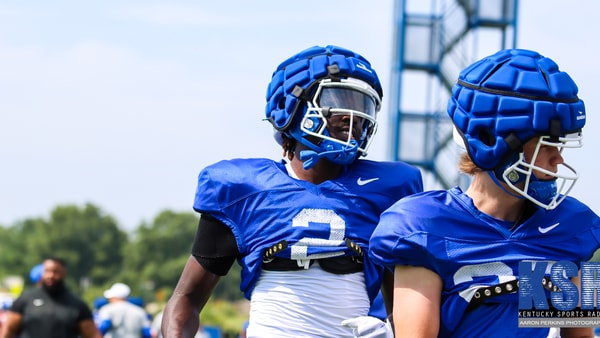[caption id="attachment_260169" align="aligncenter" width="398"]

Sanaa Lathan and Steve Harris in "Replay."[/caption]
I was at dinner with a friend when my girlfriend, Kennedy, started blowing up my phone with irate text messages.
What the heck. / That's not Twilight Zone. / That doesn't have a freaking lesson. / That's just throwing in something pretty weird and being like, "Huh, weird, right? / I am mad. This is not correct. Why did this happen to me. No good.
She was referring specifically to "Nightmare at 30,000 Feet," the second episode of the new
Twilight Zone series.
While I bemoaned the failings of "30,000 Feet" for some length last week, Kennedy put its primary issue far more succinctly than I managed to: "It is not surreal," she said. "It is a murder mystery. Rather than a 'who-dun-it,' the episode is 'who-gonna-do-it?' That isn't
Twilight Zone-y."
She has a point. The glaring flaw of the first two episodes is that the premise is not in any way metaphorical. While "The Comedian" is supernatural, the idea doesn't really hold an inherent message. "Nightmare at 30,000" is hardly supernatural and meanders endlessly to a lame climax. Serling's aim with the original
Twilight Zone was
to bring sociopolitical discussion to a television world through allegory, as outright mentioning politics would never be allowed. That the first two episodes of CBS All Access's new swing at the property are so apolitical is a peculiar failure.
The Twilight Zone's third episode, "Replay," is a massive course-correction toward political messaging. While Serling's original show could only hint at current events, "Replay" outright addresses social struggles while still maintaining the otherworldliness of the original series.
The episode revolves around Nina Harrison (Sanaa Lathan) and her son Dorian (Damson Idris) as they travel to Dorian's college freshman orientation. Nina is filming the event on a massive camcorder from years past, which Dorian takes ample time to mock. Nina discovers that when she hits the Rewind button on the camcorder time itself literally reverses. Nina uses the ability to reverse time repeatedly in attempt to avoid confrontation with Officer Lasky (Glenn Fleshler); despite the repeated do-over's, the different routes she takes to the school, and the varying degrees with which she tries to relate to Lasky, every trip to the college results in Lasky pulling Nina and Dorian over, putting them into great danger.
[caption id="attachment_260170" align="alignleft" width="300"]

Sanaa Lathan and Damson Idris in "Replay."[/caption]
"Replay," by Kennedy's metrics, is incredibly
Twilight Zone-y. It is remarkably tense; Lasky pulls the family over multiple times throughout the episode, but each encounter between the three grows more fearful. Lasky is stern and relentless, and his racism seethes through his pores any time he speaks with Nina or Dorian. The fear Nina and Dorian have of Lasky is, unfortunately, the fear that many African American families must live with. The sight of red and blue sirens always bring the prospect of fatality at the hands police, and the epidemic of police brutality is at the center of the episode's plot.
"Replay," as well as being politically cognizant, is very cheesy and sentimental – as many
Twilight Zone episodes are. Nina as more or less shunned her family and childhood life, not having talked to her brother Neil (Steve Harris) in years, nor going to her father's funeral once he passed. Dorian does not resent Nina for depriving him of an extended family, but he desperately begs her to reconnect with Neil and develop a familial connection that he has not been blessed with. The "solution" to overcoming Lasky's threatening presence is tied to Nina's family (I will not spoil how, exactly), and it brings a sappiness to the episode that the first two notably lacked.
The show emphasizes the power of solidarity. Nina needs to learn to embrace her past to ensure a safer future for her son. Her solidarity with her family – and the African American community at large – are key to the episode's thematic and emotional success. "Replay" is hopeful for the future while recognizing the difficulties that come with progress, and the balance of optimism and realism is a key tone that unites the episode with Serling's original series.
[caption id="attachment_260171" align="alignright" width="300"]

Damson Idris and Glenn Fleshler in "Replay."[/caption]
The stance that "Replay" takes against police brutality is
very likely to alienate some viewers from the show.
The original series was no stranger to episodes critiquing racism, but none were quite as overt as "Replay" is. And police brutality, especially in conservative states like Kentucky, is always sure to spark rage condemning the "war on police." CBS's release an episode so aligned with the Black Lives Matter movement (various allusions to Black Lives Matter are interspersed throughout the episode's locations) speaks to a mission of inclusion present from the series's start (thinking of Jordan Peele hosting, Kumail Nanjiani being the lead of the first episode, and
the team of African American writers who worked on "Replay") and a willingness to give stories to populations that – even in the '60s
Twilight Zone – have been excluded from Hollywood en masse.
"Replay" pushes the political legacy of Rod Serling much farther than I am sure he ever would have imagined. Even if it alienates more conservative viewers (although hopefully they will learn from the episode rather than immediately protesting it), the push works exceedingly well and is exactly what the show needed to improve on the banality of its first two episodes.
The Twilight Zone’s first episode, “The Comedian,” is free on YouTube for those without a CBS All Access subscription. All other episodes will only be available on CBS All Access.
 Sanaa Lathan and Steve Harris in "Replay."[/caption]
I was at dinner with a friend when my girlfriend, Kennedy, started blowing up my phone with irate text messages. What the heck. / That's not Twilight Zone. / That doesn't have a freaking lesson. / That's just throwing in something pretty weird and being like, "Huh, weird, right? / I am mad. This is not correct. Why did this happen to me. No good.
She was referring specifically to "Nightmare at 30,000 Feet," the second episode of the new Twilight Zone series. While I bemoaned the failings of "30,000 Feet" for some length last week, Kennedy put its primary issue far more succinctly than I managed to: "It is not surreal," she said. "It is a murder mystery. Rather than a 'who-dun-it,' the episode is 'who-gonna-do-it?' That isn't Twilight Zone-y."
She has a point. The glaring flaw of the first two episodes is that the premise is not in any way metaphorical. While "The Comedian" is supernatural, the idea doesn't really hold an inherent message. "Nightmare at 30,000" is hardly supernatural and meanders endlessly to a lame climax. Serling's aim with the original Twilight Zone was to bring sociopolitical discussion to a television world through allegory, as outright mentioning politics would never be allowed. That the first two episodes of CBS All Access's new swing at the property are so apolitical is a peculiar failure.
The Twilight Zone's third episode, "Replay," is a massive course-correction toward political messaging. While Serling's original show could only hint at current events, "Replay" outright addresses social struggles while still maintaining the otherworldliness of the original series.
The episode revolves around Nina Harrison (Sanaa Lathan) and her son Dorian (Damson Idris) as they travel to Dorian's college freshman orientation. Nina is filming the event on a massive camcorder from years past, which Dorian takes ample time to mock. Nina discovers that when she hits the Rewind button on the camcorder time itself literally reverses. Nina uses the ability to reverse time repeatedly in attempt to avoid confrontation with Officer Lasky (Glenn Fleshler); despite the repeated do-over's, the different routes she takes to the school, and the varying degrees with which she tries to relate to Lasky, every trip to the college results in Lasky pulling Nina and Dorian over, putting them into great danger.
[caption id="attachment_260170" align="alignleft" width="300"]
Sanaa Lathan and Steve Harris in "Replay."[/caption]
I was at dinner with a friend when my girlfriend, Kennedy, started blowing up my phone with irate text messages. What the heck. / That's not Twilight Zone. / That doesn't have a freaking lesson. / That's just throwing in something pretty weird and being like, "Huh, weird, right? / I am mad. This is not correct. Why did this happen to me. No good.
She was referring specifically to "Nightmare at 30,000 Feet," the second episode of the new Twilight Zone series. While I bemoaned the failings of "30,000 Feet" for some length last week, Kennedy put its primary issue far more succinctly than I managed to: "It is not surreal," she said. "It is a murder mystery. Rather than a 'who-dun-it,' the episode is 'who-gonna-do-it?' That isn't Twilight Zone-y."
She has a point. The glaring flaw of the first two episodes is that the premise is not in any way metaphorical. While "The Comedian" is supernatural, the idea doesn't really hold an inherent message. "Nightmare at 30,000" is hardly supernatural and meanders endlessly to a lame climax. Serling's aim with the original Twilight Zone was to bring sociopolitical discussion to a television world through allegory, as outright mentioning politics would never be allowed. That the first two episodes of CBS All Access's new swing at the property are so apolitical is a peculiar failure.
The Twilight Zone's third episode, "Replay," is a massive course-correction toward political messaging. While Serling's original show could only hint at current events, "Replay" outright addresses social struggles while still maintaining the otherworldliness of the original series.
The episode revolves around Nina Harrison (Sanaa Lathan) and her son Dorian (Damson Idris) as they travel to Dorian's college freshman orientation. Nina is filming the event on a massive camcorder from years past, which Dorian takes ample time to mock. Nina discovers that when she hits the Rewind button on the camcorder time itself literally reverses. Nina uses the ability to reverse time repeatedly in attempt to avoid confrontation with Officer Lasky (Glenn Fleshler); despite the repeated do-over's, the different routes she takes to the school, and the varying degrees with which she tries to relate to Lasky, every trip to the college results in Lasky pulling Nina and Dorian over, putting them into great danger.
[caption id="attachment_260170" align="alignleft" width="300"] Sanaa Lathan and Damson Idris in "Replay."[/caption]
"Replay," by Kennedy's metrics, is incredibly Twilight Zone-y. It is remarkably tense; Lasky pulls the family over multiple times throughout the episode, but each encounter between the three grows more fearful. Lasky is stern and relentless, and his racism seethes through his pores any time he speaks with Nina or Dorian. The fear Nina and Dorian have of Lasky is, unfortunately, the fear that many African American families must live with. The sight of red and blue sirens always bring the prospect of fatality at the hands police, and the epidemic of police brutality is at the center of the episode's plot.
"Replay," as well as being politically cognizant, is very cheesy and sentimental – as many Twilight Zone episodes are. Nina as more or less shunned her family and childhood life, not having talked to her brother Neil (Steve Harris) in years, nor going to her father's funeral once he passed. Dorian does not resent Nina for depriving him of an extended family, but he desperately begs her to reconnect with Neil and develop a familial connection that he has not been blessed with. The "solution" to overcoming Lasky's threatening presence is tied to Nina's family (I will not spoil how, exactly), and it brings a sappiness to the episode that the first two notably lacked.
The show emphasizes the power of solidarity. Nina needs to learn to embrace her past to ensure a safer future for her son. Her solidarity with her family – and the African American community at large – are key to the episode's thematic and emotional success. "Replay" is hopeful for the future while recognizing the difficulties that come with progress, and the balance of optimism and realism is a key tone that unites the episode with Serling's original series.
[caption id="attachment_260171" align="alignright" width="300"]
Sanaa Lathan and Damson Idris in "Replay."[/caption]
"Replay," by Kennedy's metrics, is incredibly Twilight Zone-y. It is remarkably tense; Lasky pulls the family over multiple times throughout the episode, but each encounter between the three grows more fearful. Lasky is stern and relentless, and his racism seethes through his pores any time he speaks with Nina or Dorian. The fear Nina and Dorian have of Lasky is, unfortunately, the fear that many African American families must live with. The sight of red and blue sirens always bring the prospect of fatality at the hands police, and the epidemic of police brutality is at the center of the episode's plot.
"Replay," as well as being politically cognizant, is very cheesy and sentimental – as many Twilight Zone episodes are. Nina as more or less shunned her family and childhood life, not having talked to her brother Neil (Steve Harris) in years, nor going to her father's funeral once he passed. Dorian does not resent Nina for depriving him of an extended family, but he desperately begs her to reconnect with Neil and develop a familial connection that he has not been blessed with. The "solution" to overcoming Lasky's threatening presence is tied to Nina's family (I will not spoil how, exactly), and it brings a sappiness to the episode that the first two notably lacked.
The show emphasizes the power of solidarity. Nina needs to learn to embrace her past to ensure a safer future for her son. Her solidarity with her family – and the African American community at large – are key to the episode's thematic and emotional success. "Replay" is hopeful for the future while recognizing the difficulties that come with progress, and the balance of optimism and realism is a key tone that unites the episode with Serling's original series.
[caption id="attachment_260171" align="alignright" width="300"] Damson Idris and Glenn Fleshler in "Replay."[/caption]
The stance that "Replay" takes against police brutality is very likely to alienate some viewers from the show. The original series was no stranger to episodes critiquing racism, but none were quite as overt as "Replay" is. And police brutality, especially in conservative states like Kentucky, is always sure to spark rage condemning the "war on police." CBS's release an episode so aligned with the Black Lives Matter movement (various allusions to Black Lives Matter are interspersed throughout the episode's locations) speaks to a mission of inclusion present from the series's start (thinking of Jordan Peele hosting, Kumail Nanjiani being the lead of the first episode, and the team of African American writers who worked on "Replay") and a willingness to give stories to populations that – even in the '60s Twilight Zone – have been excluded from Hollywood en masse.
"Replay" pushes the political legacy of Rod Serling much farther than I am sure he ever would have imagined. Even if it alienates more conservative viewers (although hopefully they will learn from the episode rather than immediately protesting it), the push works exceedingly well and is exactly what the show needed to improve on the banality of its first two episodes.
The Twilight Zone’s first episode, “The Comedian,” is free on YouTube for those without a CBS All Access subscription. All other episodes will only be available on CBS All Access.
Damson Idris and Glenn Fleshler in "Replay."[/caption]
The stance that "Replay" takes against police brutality is very likely to alienate some viewers from the show. The original series was no stranger to episodes critiquing racism, but none were quite as overt as "Replay" is. And police brutality, especially in conservative states like Kentucky, is always sure to spark rage condemning the "war on police." CBS's release an episode so aligned with the Black Lives Matter movement (various allusions to Black Lives Matter are interspersed throughout the episode's locations) speaks to a mission of inclusion present from the series's start (thinking of Jordan Peele hosting, Kumail Nanjiani being the lead of the first episode, and the team of African American writers who worked on "Replay") and a willingness to give stories to populations that – even in the '60s Twilight Zone – have been excluded from Hollywood en masse.
"Replay" pushes the political legacy of Rod Serling much farther than I am sure he ever would have imagined. Even if it alienates more conservative viewers (although hopefully they will learn from the episode rather than immediately protesting it), the push works exceedingly well and is exactly what the show needed to improve on the banality of its first two episodes.
The Twilight Zone’s first episode, “The Comedian,” is free on YouTube for those without a CBS All Access subscription. All other episodes will only be available on CBS All Access.








Discuss This Article
Comments have moved.
Join the conversation and talk about this article and all things Kentucky Sports in the new KSR Message Board.
KSBoard